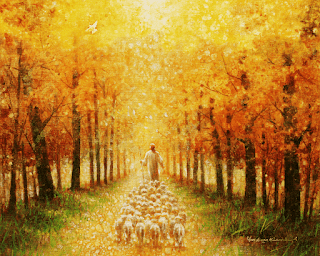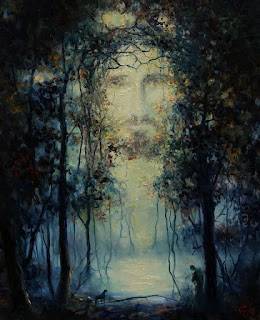2nd Sunday after Easter
John 10:1-16
“Yes,
the truth I say to you: Anyone who does not go into the sheep through the door,
but breaks into the fold elsewhere, is a thief or robber. Only he who enters by
the door is a shepherd of the sheep.
To him, the
doorkeeper opens, and the sheep respond to his voice. He calls each one by
name, according to its nature, and he leads them out into the open.
When he has brought them out, he walks before them,
and the sheep follow after him, for they trust his voice. A stranger they will
not follow, but rather flee because they do not know the stranger’s voice.”
Thus did Jesus reveal himself to them in pictures,
but they did not understand what he was saying to them.
Then Jesus went on. “Yes, the truth out of the
spirit I say to you. I AM the door to the sheep. All who came before me were
thieves and robbers. But the sheep did not listen to them.
I AM the door. Anyone who enters through me will
find healing and life. He learns to cross the threshold from here to beyond,
and from there to here, and he will find nourishment for his soul. The thief
comes only to steal and kill and destroy.
But I – I have come that they may have life, and overflowing abundance.
I AM THE GOOD SHEPHERD.
The good shepherd lays down
his life for the sheep. He who works for wages, and who is no true shepherd,
whose sheep are not his own, sees the wolf coming, abandons the sheep, and
flees while the wolf snatches them and scatters them. For he is only a hireling
and he cares nothing for the sheep.
 |
| Brueghel, Bad Sheperd |
I AM THE GOOD SHEPHERD. I know who belongs to me,
and my own recognize me, just as my Father recognizes me in the depths, and I
know the being of the Father; I offer my life for the sheep.
Other sheep have been entrusted to me who are not
of this fold; I must also lead them. They too will listen to my voice, and one
day there will be one flock, one Shepherd.
2nd after Easter II
April 29,2020
John 10:1-16
In this parable of the Good
Shepherd,
we might not like seeing ourselves cast as sheep. We might prefer the
parable of the single lost sheep,* the one who is so important to the shepherd
that he leaves the rest of the flock to go searching for it. But in today’s
picture, Christ is speaking about his relationship to those who find themselves
in communities, those who are gathered together. And he is looking at the ways
in which His flock, His community is either protected or threatened.
 |
| Tissot |
What is it that holds His community
together, gives it cohesion? It is Christ himself who holds His community
together. The will of the group is to follow in trust Christ’s will: his being, his
love.
It is He who knows what we need—when
it is time to go out and be fed and when it is time to stay safe in the fold. We,
the flock, know that we can trust and follow His voice. He knows us,
individually and collectively. He speaks to us in the sacraments, in prayer. He
continues to offer His life for us, to us, in physical and spiritual
communion. It is He who cares for, protects, and guides the life of His
community.
Christ gathers us into a community
to protect us from the wolves of solitude, illusion, and untruth. Those wolves
divide and scatter, snatch and devour. Christ keeps us together, saying, in the words of
the poet:
Will steal you if you don’t stay
near,
And sell you as a slave in the
Market.
I sing to the nightingales’
hearts,
Hoping they will learn
My verse.
So that no one will ever
imprison
Your brilliant angel
Feathers.
Have I put enough spiced manna
On your plate?
…If not, please wait
For more light is now
fermenting. . . **
*Luke 15:3
**Hafiz, “Spiced Manna”, in The
Gift, by Daniel Ladinsky, p. 210
Visit our website: www.thechristiancommunity.org























